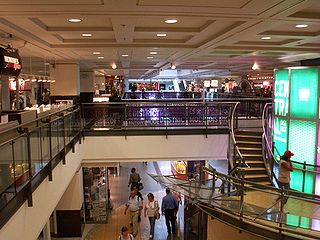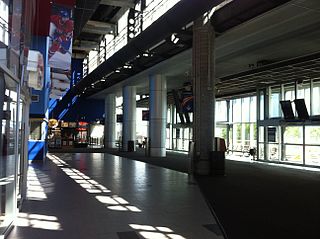
RÉSO, commonly referred to as the Underground City, is the name applied to a series of interconnected office towers, hotels, shopping centres, residential and commercial complexes, convention halls, universities and performing arts venues that form the heart of Montreal's central business district, colloquially referred to as Downtown Montreal. The name refers to the underground connections between the buildings that compose the network, in addition to the network's complete integration with the city's entirely underground rapid transit system, the Montreal Metro. Moreover, the first iteration of the Underground City was developed out of the open pit at the southern entrance to the Mount Royal Tunnel, where Place Ville Marie and Central Station stand today.

The Green Line, also known as Line 1, is one of the four lines of the Montreal Metro in Montreal, Quebec, Canada. The line runs through the commercial section of downtown Montreal underneath Boulevard de Maisonneuve, formerly Rue de Montigny. It runs mainly on a northeast to southwest axis with a connection to the Orange and Yellow Lines at Berri-UQAM, and with the Orange Line west of downtown at Lionel-Groulx.

Berri–UQAM station is a Montreal Metro station in the borough of Ville-Marie, in Montreal, Quebec, Canada. It is operated by the Société de transport de Montréal (STM) and is the system's central station. This station is served by the Green, Orange, and Yellow lines. It is located in the Quartier Latin.

The Yellow Line, also known as Line 4, is one of the Montreal Metro's four routes operating in Montreal, Quebec, Canada.

De L'Église station is a Montreal Metro station in the borough of Verdun in Montreal, Quebec, Canada. It is operated by the Société de transport de Montréal (STM) and serves the Green Line. The station opened on September 3, 1978, as part of the extension of the Green Line westward to Angrignon station.

Lionel-Groulx station is a Montreal Metro station in the borough of Le Sud-Ouest in Montreal, Quebec, Canada. It is operated by the Société de transport de Montréal (STM) and is a transfer station between the Green Line and Orange Line, with cross-platform interchange available. It is located in the Saint-Henri area, along Atwater Avenue on that area's eastern border with Little Burgundy. If transfers between lines are included, the station is one of the busiest on the Metro. It first opened in 1978.

D'Iberville station is a Montreal Metro station in Montreal, Quebec, Canada. It is operated by the Société de transport de Montréal (STM) and serves the Blue Line. It opened in 1986. It is located at the southwestern tip of the Saint-Michel neighborhood.

Bonaventure station is a Montreal Metro station in the borough of Ville-Marie in Montreal, Quebec, Canada. It is operated by the Société de transport de Montréal (STM) and serves the Orange Line. It opened on February 13, 1967, four months after most of the initial network. It served as the western terminus of the Orange Line for 14 years until the extension to Place-Saint-Henri station opened in 1980.

Lucien-L'Allier station is a Montreal Metro station in the borough of Ville-Marie in Montreal, Quebec, Canada. It is operated by the Société de transport de Montréal (STM) and serves the Orange Line.

Vendôme station is an intermodal transit station in the borough of Côte-des-Neiges–Notre-Dame-de-Grâce in Montreal, Quebec, Canada, near the town of Westmount in the Westmount Adjacent area of Notre-Dame-de-Grâce that adjoins the Décarie Expressway. It is operated by the Société de transport de Montréal (STM) and serves the Orange Line of the Montreal Metro.

Du Collège station is a Montreal Metro station in the borough of Saint-Laurent in Montreal, Quebec, Canada. It is operated by the Société de transport de Montréal (STM) and serves the Orange Line. It opened on January 9, 1984, and replaced Plamondon station as the western terminus of the line until Côte-Vertu station opened in 1986.

Longueuil station, officially Longueuil–Université-de-Sherbrooke station, is a Montreal Metro station in Longueuil, Quebec, Canada. It is operated by the Société de transport de Montréal (STM) and is the southern terminus of the Yellow Line. It is connected to a campus of Université de Sherbrooke, as well as the largest bus station in Greater Montreal, Terminus Longueuil.

Saint-Jérôme is a commuter railway line in Greater Montreal, Quebec, Canada. It is operated by Exo, the organization that operates public transport services across this region.

Lucien-L'Allier station is a commuter rail terminal in Montreal, Quebec, Canada. It is the terminal for Exo's Vaudreuil-Hudson, Saint-Jérôme, and Candiac lines. Lucien-L'Allier is in ARTM fare zone A. It is one of the two downtown terminals for Montreal commuter trains, the other being Montreal Central Station.

Downtown Montreal is the central business district of Montreal, Quebec, Canada.

Windsor Station is a former railway station in Montreal, Quebec, Canada. It used to be the city's Canadian Pacific Railway (CPR) station, and served as the headquarters of CPR from 1889 to 1996. It is bordered by Avenue des Canadiens-de-Montréal to the north, Peel Street to the east, Saint Antoine Street to the south and the Bell Centre to the west.

The Montreal Metro is a rubber-tired underground rapid transit system serving Greater Montreal, Quebec, Canada. The metro, operated by the Société de transport de Montréal (STM), was inaugurated on October 14, 1966, during the tenure of Mayor Jean Drapeau.

Saint-Jérôme station is an intermodal transit station in Saint-Jérôme, Quebec, Canada. It serves Exo and intercity buses as well as Exo commuter rail trains on the Saint-Jérôme line.

Saint Antoine Street, formerly known as Craig Street, is a street located in Montreal, Quebec, Canada. It runs to the south of Downtown Montreal and north of Old Montreal and Griffintown and Saint-Henri. It crosses the Quartier international de Montréal. Between Atwater Avenue and Greene Avenue, the north side of the street is in Westmount.
Montreal has a developed transport infrastructure network, which includes well-developed air, road, rail, and maritime links to the rest of Canada, as well as the United States and the rest of the world. Local public transport includes a metro system, buses, ferry services and cycling infrastructure.


















